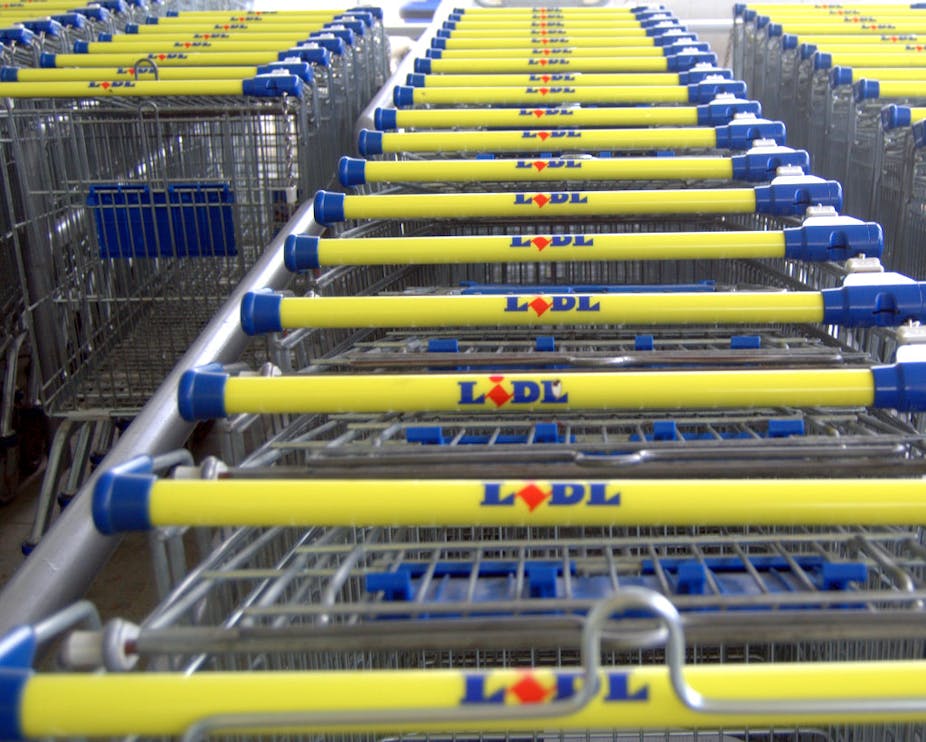Australian shoppers have inadvertently invited global discount grocers to our shores by demonstrating their readiness to adopt private labels. In 2001, German discounter Aldi opened its first store in Sydney. The impact this business format would have on the Australian grocery sector was underestimated.
Initially, Aldi was dismissed as a small “no-frills” food store that provided a small range of non-branded products. Thirteen years later Aldi has over 340 stores, is the third-largest food retailer in Australia and continues to grow at a staggering rate, with plans to expand operations into SA and WA.
Aldi’s success has not gone unnoticed by other foreign-owned discount grocers, with reports German-owned Lidl is scouting for sites and Danish discounter Netto also considered a candidate.
Lidl has already established an office in Australia and its brand name is registered with the Australian Securities and Investment Commission.
What is Lidl?
Owned by German-based Schwartz Group, Lidl’s history dates back to the 1930s, when it opened as a food wholesaler. The first retail stores were opened in 1973 throughout Germany.
During the 1990s Lidl began its global expansion. By 2011, it had expanded its sites to 26 countries across Europe and Britain, generating a staggering US$88 billion in annual sales. Nearly 60% of this revenue came from international operations.
Currently the 8th largest food retailer in the world (Woolworths rates 17th, followed by Wesfarmers (Coles) in 18th position), the sales of Lidl continue to surpass the total sales of both Coles and Woolworths together. Operating from small footprints of between 750sqm to 1,750sqm, Lidl sells a small range of private label products, consumer electronics, apparel and general merchandise.
Similar to Aldi, Lidl has adopted the “no-frills” supermarket approach. Shoppers select products direct from open cartons, off pallets and deep freezers. Coin-released trolleys force shoppers to return them and remove the need for trolley collection contractors.
Staffing is minimal, there are no loyalty schemes and you pay for carry bags. Unlike Aldi, Lidl offers a small range of “branded products”, at very low prices. Although it imports many low-priced gourmet foods from Europe, it also sources many local products from the country where the store is located.
Keeping operational costs low, global buying power, a smattering of brands mixed with quality imported European private label products, and small stores that fit into localities large supermarkets cannot get into: that seems to be Lidl’s model for success.
But the simple duplication of the Aldi model is a risky strategy as Aldi already has already established itself as a household name in Australia. Lidl will need to clearly differentiate though range, service, price or location.
Although Lidl and Aldi co-exist in many countries, our dispersion and size of population will present a challenge. Finding suitable store locations also remains a challenge, despite Woolworths’ decision to wind back the practice of buying land for future developments.
What does this mean for Australian players?
Price pressure from Lidl is likely to lead to further discounting and a continued growth of private label groceries. We can also expect to see Aldi agressively push ahead more quickly with its plans for expansion into SA and WA, before Lidl gets a foothold.
Smart shoppers are questioning the price they are paying for groceries and are abandoning full-line, traditional supermarkets for low-cost food operators. Internationally, we have seen shoppers desert traditional full-line supermarkets and move to low-cost grocers like Lidl, Aldi and Netto.
In Britain, the market share of the traditional full-line supermarkets, Tesco, Asda, Sainsbury’s and Morrisons, fell. In contrast, Lidl’s sales grew by 13.8% year-on-year. Aldi’s market share in the UK also increased to 4.8% (up from 3.7%), while the UK’s largest supermarket, Tesco, dropped from 30.3% to 28.9%.
Although Lidl will compete directly with Aldi, Coles and Woolworths should not be quick to dismiss this potential new entrant. Concerned by customers shifting to low-cost, discount retailers, UK supermarket Sainsbury’s this year announced plans for a joint venture with Danish discount grocer Netto, enabling it once again to enter the UK market.
Quite possibly Coles’ dumping of its “no-frills” Bi-Lo brand may have been a little premature. Logically, it is not unreasonable to think Coles may do the same here in Australia to combat these international discounters.
A win for private labels
Private label products have come a long way. Both Coles and Woolworths have implemented a good, better and best private label strategy. As such, shoppers now feel confident in purchasing these products. The proportion of private label in Australian supermarkets is estimated to be about 20% dollar share, which is a long way behind the UK at 46% and 32% in Germany, suggesting we still have a way to go.
With the majority of Aldi’s range being private label, it suggests shoppers are shifting to these generic brands. Australian shoppers also appear keen to trial novel and unknown brands.

